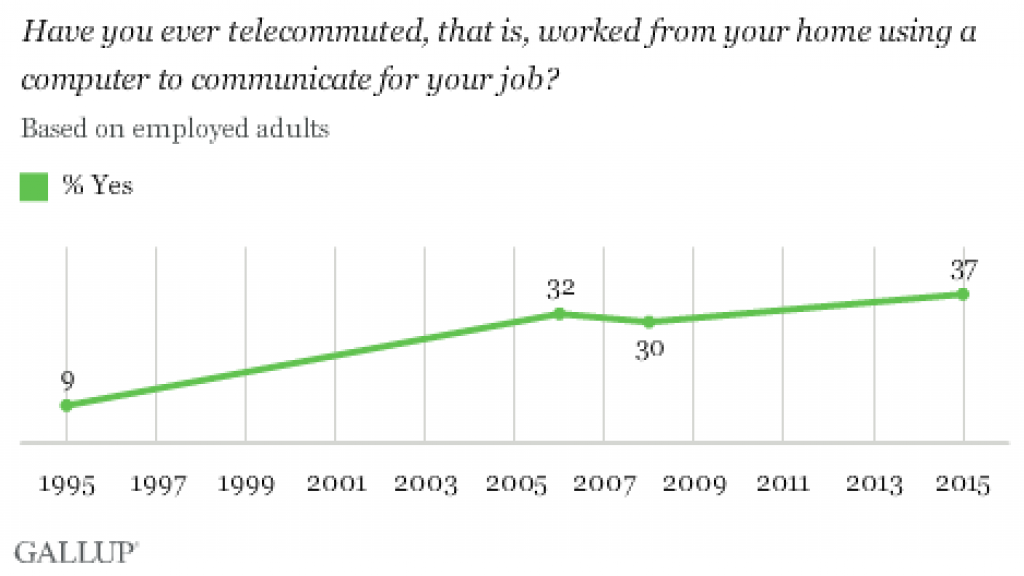Why companies who don’t embrace remote working are wrong

Things change, and as you get older and reminisce on how good Thundercats were or how the new Star Wars films compare to the originals, you get to think about what else may have changed…is there a new version of working remotely?!
Yes, and although we don’t have R2-D2 following us (yet), even things we did 10 years ago have been updated. For example, the way we can now stream movies from Netflix.
So too the way we work, it’s hard to believe there was a time when we didn’t know what social media was or feel the need to check a news feed every 30 mins ;-)
The office environment has changed, but so too has remote working — Tweet this
The office environment has changed, but so too has remote working, gone are the days when your boss thinks you’re watching TV instead of working!

Remote work and telecommuting are becoming more mainstream, with 37% of workers telecommuting in the US, compared to the 9% in 1995, it’s even given rise to a completely new lifestyle: the digital nomad, the connected adventurer.

We now have platforms where companies can find and hire freelancers and remote talent from all over the world, as well as job sites that offer remote employment.
The way of work is changing, our employment no longer needs to be tied to a physical location, for many jobs, we have the ability to work from anywhere!
But there are companies who are still against it — notable ones include Yahoo and Best Buy, who feel it’s necessary to physically locate everyone together to improve collaboration.
Are there other ways to improve collaboration? (Spoiler alert! Yes!).
This is how we’ve always done it and it works fine
“I’ve been in this business for XYZ years, and this is how we do things here!”
Does that sound familiar? You only have to think of companies like Kodak or Blockbuster to see how not supporting change can lead to disaster!

I think we can all agree that digital photography and streaming movies are much better for us. The benefits are obvious now and somewhat taken for granted, but when new things emerge it’s not always so clear.
Sometimes things have to evolve, and sometimes the only way you can see the benefits is to try out something new.
Remote working is one of those tectonic shifts. If you stay behind, you’ll be left behind, especially in digital industries, businesses with services like SEO and Social Media Marketing.
Of course, there will be jobs where telecommuting isn’t practical, but in situations where all you need is a computer and an internet connection, then telecommuting is something to try.
When all you need is a computer and an internet connection, then telecommuting is something to try! — Tweet this
Companies have seen increased productivity and lower staff turnover when employees are given the tools needed to work remotely effectively.
Tools like PukkaTeam, Slack, Google Apps. But can a collection of software still make profitable businesses?
Having a remote/distributed team can work!
With today’s technology, being part of a successful remote team is easier than ever.
A quick search on Google (or your favourite search engine), will show numerous successful companies with distributed teams, here are a few notable ones.
Buffer — you may know the social media management app, the team that created and manage this are fully distributed. With over 2 million people using Buffer, it just goes to show how successful a fully distributed team can be.
Mozilla — the team that brought you Firefox, they have 13 offices around the world, and employees in more than 30 countries, they understand that there are people who prefer (or are only able) to work remotely as well as others who prefer working in a physical office.
Zapier — The web automation app that simplifies and automates the repetitive tasks. Their team is 100% distributed throughout the world.
Spotify — That’s right, the popular music app has both physical offices and distributed employees, and now has an estimated worth at over $8 billion.
These companies are not just doing ok, they’re at the top of their respective industries.
How? One major reason is that by having distributed teams and employees that telecommute, they open themselves up to greater employment opportunities
They aren’t restricted to hiring people within a travelable distance from their office and they can hire the top talent from anywhere in the world.
Hire the top talent, from anywhere in the world with remote working — Tweet this
They also lower overheads by having fewer or even no offices, are greener and benefit from greater employee satisfaction.
Remote working going forward

Remote working is not something that is going to go away, more people are looking for flexible roles with companies who understand that there’s more to life than work.
More people are looking for flexible roles with companies who understand that there’s more to life than work — Tweet this
Make sure you’ve updated yourself on the tools and software that take a lot of the worries away from allowing people to work remotely and IMPROVE the communication and presence of the ones that do work remotely.
So are companies who don’t embrace remote work wrong?
As we’ve seen, there are companies who’ve been very successful with having remote workers and teams, and how failing to evolve leaves you worse off in the end.
If all you need to work is a computer and internet connection, it’s definitely something to introduce, don’t let your best people move to greener pastures because they don’t have the flexibility they want or need.

What you need to make sure is you can easily stay connected and work efficiently with people that work remotely, and this starts by using the right tools, a few we use are:
Slack is a nice little instant messaging app, that’s great for dropping someone a quick message they can read when they have a moment.
PukkaTeam to build team presence and office community, make communicating with remote teams easier by being quickly able to see if someone’s available. (PS. we’ve built this)
Skype and Google hangouts make it easy to video call and speak to other remote team members.
Want to improve your team communication and collaboration, try PukkaTeam free, and bring your team, together.



 Form the Blog
Form the Blog